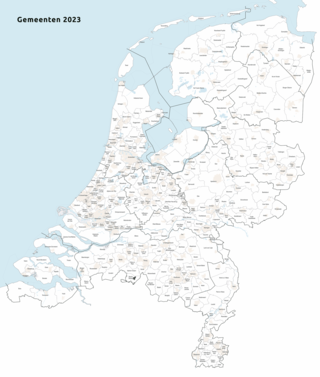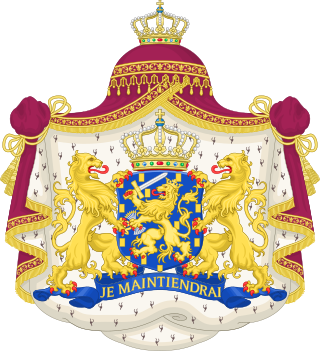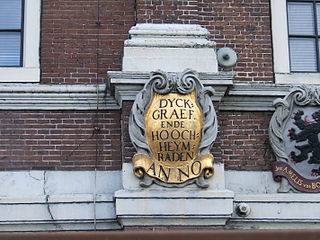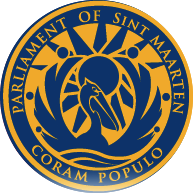
The Eindhoven University of Technology, abbr. TU/e, is a public technical university in the Netherlands, situated at Eindhoven. In 2020–21, around 14,000 students were enrolled in its BSc and MSc programs and around 1350 students were enrolled in its PhD and PDEng programs. In 2021, the TU/e employed around 3900 people.

There are twelve provinces of the Netherlands, representing the administrative layer between the national government and the local municipalities, with responsibility for matters of subnational or regional importance.

The politics of the Netherlands take place within the framework of a parliamentary representative democracy, a constitutional monarchy, and a decentralised unitary state. The Netherlands is described as a consociational state. Dutch politics and governance are characterised by a common striving for broad consensus on important issues, within both of the political community and society as a whole.
Voivode, also spelled voivod, voievod or voevod and also known as vaivode, voivoda, vojvoda or wojewoda, is a title denoting a military leader or warlord in Central, Southeastern and Eastern Europe in use since the Early Middle Ages. It primarily referred to the medieval rulers of the Romanian-inhabited states and of governors and military commanders of Ukrainian Cossacks, Hungarian, Balkan, Russian people and other Slavic-speaking populations.


As of 1 January 2023, there are 342 municipalities and three special municipalities in the Netherlands. The latter is the status of three of the six island territories that make up the Dutch Caribbean. Municipalities are the second-level administrative division, or public bodies, in the Netherlands and are subdivisions of their respective provinces. Their duties are delegated to them by the central government and they are ruled by a municipal council that is elected every four years. Municipal mergers have reduced the total number of municipalities by two-thirds since the first official boundaries were created in the mid 19th century. Municipalities themselves are informally subdivided into districts and neighbourhoods for administrative and statistical purposes.

The National Bank of Belgium has been the central bank of Belgium since 1850. The National Bank of Belgium was established with 100% private capital by a law of 5 May 1850 as a naamloze vennootschap (NV). It is a member of the European System of Central Banks and the Eurosystem. Until January 1999 when Belgium adopted the euro, the bank was responsible for the former national currency, the Belgian franc.
A food safety agency or food administration or Food Safety Authority is a government agency responsible for ensuring the safety, quality, and proper labeling of food products within a country or region. These agencies play a crucial role in protecting public health by establishing and enforcing regulations and standards to ensure that food produced, imported, processed, distributed, and sold is safe for consumption.

The National Institute for Public Health and the Environment is a Dutch research institute that is an independent agency of the Ministry of Health, Welfare and Sport.

In the Netherlands, a water board, water council or water authority is a regional governing body solely charged with the management of surface water in the environment. Water boards are independent of administrative governing bodies like provinces and municipalities. In general, they are responsible for managing rivers and canals, issues with the flow of watercourses and drainage issues, water collection, flood and erosion prevention and provision of potable water. They manage polder systems, water levels, water barriers and locks, enforcements, water quality and sewage treatment in their respective regions. The concept of a coordinating "High Water Authority" (Hoogheemraadschap) originated in what now is the province of South Holland in the 12th century.
The Dietary Guidelines for Americans (DGA) provide nutritional advice for Americans who are healthy or who are at risk for chronic disease but do not currently have chronic disease. The Guidelines are published every five years by the US Department of Agriculture, together with the US Department of Health and Human Services. Notably, the most recent ninth edition for 2020–25 includes dietary guidelines for children from birth to 23 months. In addition to the Dietary Guidelines per se, there are additional tools for assessing diet and nutrition, including the Healthy Eating Index (HEI), which can be used to assess the quality of a given selection of foods in the context of the Dietary Guidelines. Also provided are additional explanations regarding customization of the Guidelines to individual eating preferences, application of the Guidelines during pregnancy and infancy, the USDA Nutrition Evidence Systematic Review, information about the Nutrition Communicators Network and the MyPlate initiative, information from the National Academies about redesigning the process by which the Dietary Guidelines for Americans are created, and information about dietary guidelines from other nations.

In the Netherlands, the municipal executive is the executive board of a municipality. It plays a central role in municipal politics in the Netherlands, similar to the communal college in Belgium. It consists of the mayor and the members of the municipal executive (aldermen).

The Dutch Safety Board is the official body that investigates a wide variety of safety matters in the Netherlands. It is based in The Hague.

The Scientific Council for Government Policy is an independent think tank of the Government of the Netherlands based in The Hague, whose members include prominent social scientists, economists and legal scholars.

The Dutch Research Council is the national research council of the Netherlands. NWO funds thousands of top researchers at universities and institutes and steers the course of Dutch science by means of subsidies and research programmes. NWO promotes quality and innovation in science. NWO is an independent administrative body under the auspices of the Dutch Ministry of Education, Culture and Science. NWO directs its approximate budget of 1 billion euros towards Dutch universities and institutes, often on a project basis. Also, NWO has its own research institutes and facilitates international cooperation. Current president of NWO since April 1, 2021 is Marcel Levi. Former NWO presidents include Stan Gielen, Peter Nijkamp and Jos Engelen.

The Caribbean Netherlands are the three public bodies of the Netherlands that are located in the Caribbean Sea. They consist of the islands of Bonaire, Sint Eustatius and Saba, although the term "Caribbean Netherlands" is sometimes used to refer to all of the islands in the Dutch Caribbean. In legislation, the three islands are also known as Bonaire, Sint Eustatius and Saba or the BES islands. The islands are currently classified as public bodies in the Netherlands and as overseas countries and territories of the European Union; thus, European Union law does not automatically apply.

The Parliament of Sint Maarten is a unicameral legislature that consists of 15 members, each elected for a four-year term in a general election. The first parliament was installed on 10 October 2010, the date of the dissolution of the Netherlands Antilles, and consisted of the members of the island council elected on 17 September 2010. The current President of Parliament is Grisha Heyliger-Marten.

Nederlandse Publieke Omroep or Dutch Foundation for Public Broadcasting is a Dutch public broadcasting organisation that administers public broadcasting services in the Netherlands. The NPO is also the owner of the radio-spectrum licence and public DVB-T and DAB+ frequencies.

The Health and Youth Care Inspectorate is a governmental institution that supervises public health in the Netherlands. It is part of the Ministry of Health, Welfare and Sport, located in Utrecht. The IGJ supervises the quality, safety and accessibility of health care, and guards the rights of patients. The current Inspector-General is dr. Ronnie van Diemen-Steenvoorde.
The Dutch Data Protection Authority is the data protection authority for the Netherlands and an independent administrative body that has been appointed by law as the supervisory authority for the processing of personal data. The organization is therefore concerned with privacy. The duties of the AP derive from the Data Protection Directive that applies to all countries of the EU. This directive has been replaced by the General Data Protection Regulation. The Implementation Act General Data Protection Regulation has replaced the Personal Data Protection Act and appointed the AP as supervisor. All EU Member States have their own body, similar to the AP.















